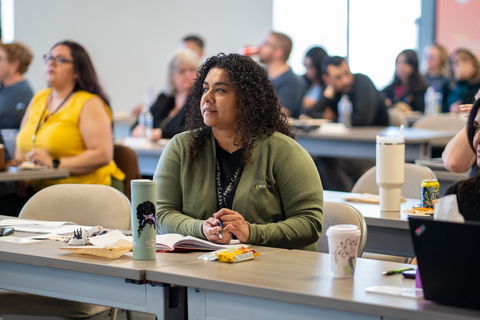Learn4Life’s trauma-resilient approach is doing just that
Alexandria T.’s home life was rocky, and she struggled with mental health challenges, including ADHD, anxiety and depression. In high school, she got little support and found it hard to concentrate on studies. Instead of dropping out, she transferred to Learn4Life, a network of 80+ public high schools that offers personalized instruction and a trauma-resilient approach, where Alexandria finally received the help she needed.
This press release features multimedia. View the full release here: https://www.businesswire.com/news/home/20240516523823/en/

Learn4Life educators participate in training to become Trauma-Resilient Professionals to better serve students (Photo: Business Wire)
Teens want schools to play a bigger role in their mental health, and they trust the information they get there, according to a recent survey by the National Alliance on Mental Health (NAMI). More than two-thirds of students agree schools should teach what mental health is, and where and how to seek treatment. Yet, only 40 percent of teens say their school has specific programs or resources to support mental health.1
Learn4Life, which has offered a trauma-resilient approach for the past 15 years, is taking it a step further by having hundreds of its student-facing staff of teachers, tutors, counselors, social workers and more become certified professionals by Trauma-Resilient Educational Communities (TREC).
The TREC model, based on Positive and Adverse Childhood Experiences (PACES) science and protocols, is an active, integrated approach to learning and practicing the skills of a trauma-resilient education. The 20-hour curriculum includes identifying trauma in students and teaching them how to build resilience in the face of life’s ups and downs, and developing healthy, trusted relationships. TREC schools practice restorative justice rather than punishing students who might be acting out as a response to trauma.
The multiphase certification program ensures educators understand trauma, while being culturally responsive to cultivate love, compassion and empathy for every student. A key element is the importance of engaging in self-care and mindfulness to avoid teacher burnout. The program benefits entire educational communities by providing useful techniques to create harmony in and outside of the classroom.
“Students in trauma respond in different ways, but at school it can manifest in things like truancy, difficulty concentrating, isolation and risky behavior like substance abuse,” explained Craig Beswick, trauma resiliency specialist at Learn4Life. “We know that before we can reach students’ heads, we need to reach their hearts.”
According to Beswick, Learn4Life students who are engaged with TREC resiliency programs and social-emotional learning curriculum earn 17 percent more credits per learning period compared to non-TREC engaged students, and graduate at a six percent higher rate.
Alexandria graduated from Learn4Life and is a student at San Diego State University, working toward a bachelor’s degree in child development and plans to apply to their master’s program in social work or counseling.
“Learn4Life taught me that even when you think the whole world is against you, there are always people out there who care about you. They want to see you succeed, but you have to be open to receive the support,” she said.
May is Mental Health Awareness Month, started by NAMI in 1949 to end the stigma of mental health, extend support and advocate for policies that prioritize the wellbeing of individuals and families affected by mental illness.
For more information about Learn4Life and its trauma-resilient education, visit www.learn4life.org/programs/trauma-resilient-education/.
About Learn4Life
Learn4Life is a network of nonprofit public high schools that provide students personalized learning, career training and life skills. Each school is locally controlled, tuition free and gives students the flexibility and one-on-one attention they need to succeed. Serving more than 59,000 students through a year-round program, we help them prepare for a future beyond high school. For more information, please visit www.learn4life.org.
________________
1 https://www.nami.org/support-education/publications-reports/survey-reports/poll-of-teen-mental-health-from-teens-themselves-2022/
View source version on businesswire.com: https://www.businesswire.com/news/home/20240516523823/en/
Contacts
Ann Abajian, Learn4Life
(559) 903-7893
PR@learn4life.org





